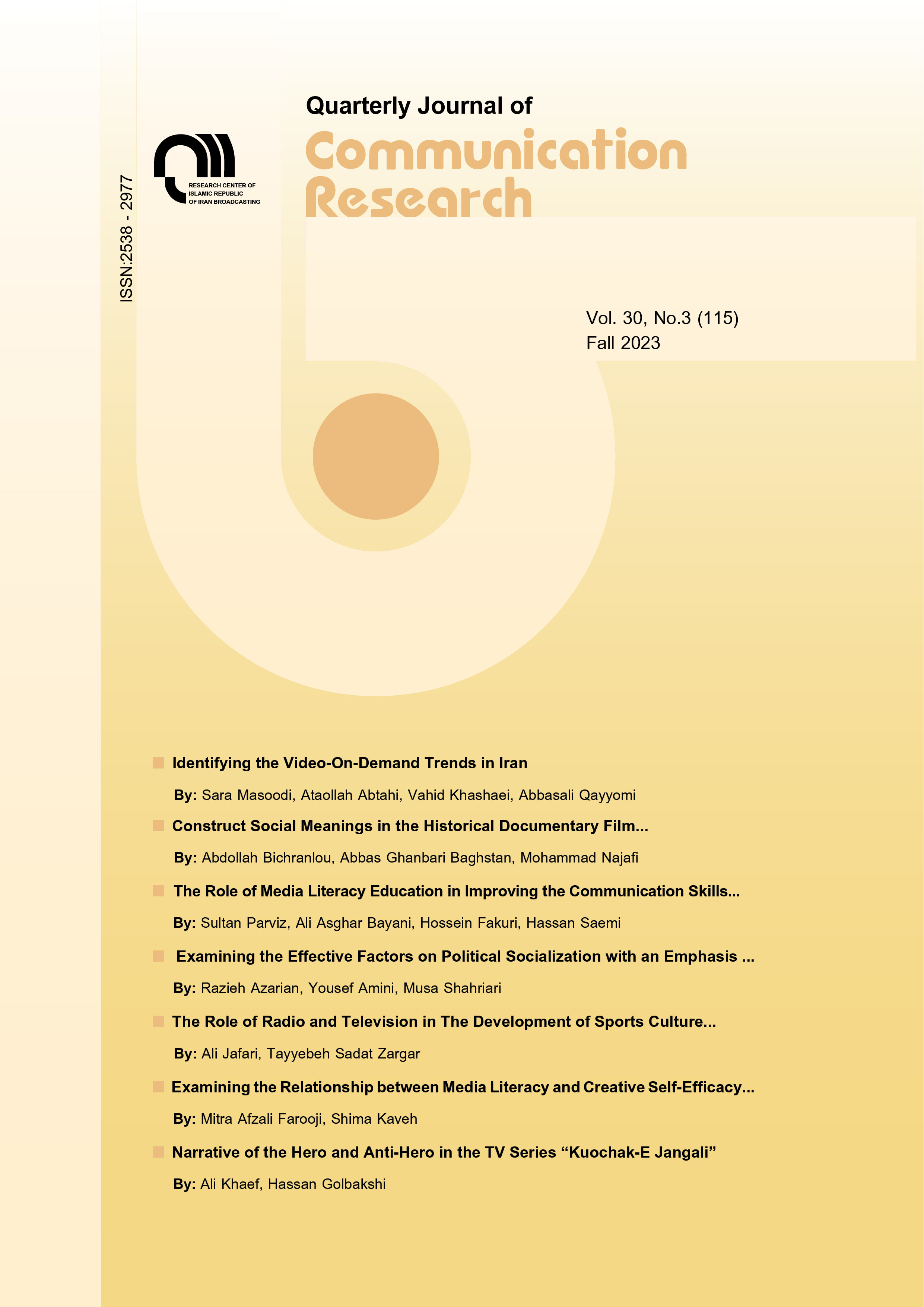Abdollahi, R.; Eslami, E. & Afaghi, K. (2018). Content Analysis Of The Textbook Thinking And Media Literacy Of Freshman Students Based On Media Literacy Education. Journal Of Thinking And Child, 9 (2).
Alikhani, H. & Karimi, Z. (2016). Teaching Media Literacy. Journal Of Growth Of Technical And Professional Education And Knowledge Work, 12(3), 47-50.
Amiri, J.; Zablizadeh, A. & Karmi Nomyoundi. S. (2018). Solutions To Increase Media And Information Literacy Of Teachers. Journal Of Media Studies, 14(44), 7-21.
Chaleshgar Kurd Asiabi, M. & Ashkurkiaei, Z. (2021). Media Literacy In Students: A Systematic Study. Journal Of Clinical Excellence, 11(3), 35-46.
Ghasemi, H.; Keshkar, S.; Rasakh, N. & Karmi, A. (2016). Content Analysis Of Communication Messages. Tehran: Andishe Ara Pub.
Hargie, O.; Saunders, Ch. & Dickson, D. (2021). Social Skills In Interpersonal Communication, 3re Ed. (Firouzbakht, M. & Khashayarbeygi Trans.). Tehran: Javaneh Roshd Pub. (Original Work Published 1994).
Hevans, T. (2017). Understanding Media Industries (Shahghasemi, E. Trans.). Tehran: Logos Pub. (Original Work Published 2012).
Hoseyni Pakdehi, A. & Shobeyri, H. (2017). Media Literacy Education In Cyberspace A Case Study Of Canadian Website “Media Smarts” And Iranian Website “Media Literacy”. Journal Of New Media Studies, 3 (9), 31-76.
Kazemi, H. (2016). The Effectiveness Of Communication Skills Training On Controlling The Experience Of Negative Emotions And The Ways Of Coping With Stress In Teenagers. (M.A. Thesis). Payame Noor University, Tehran.
Mahmoudi Kokandeh, S. M. (2021). Study On The Necessity Of Media Literacy Training For Children And Teenagers From The Point Of View Of Experts In The Field Of Education. (M.A. Thesis). Islamic Azad University, Central Tehran Branch, Tehran.
Mazaheri, A. & Rezakhani, S. (2017). The Effectiveness Of Communication Skills Training On The Increase Of Self-Esteem And Decrease Of Parent-Child Conflicts Among Female High School Students. Journal Of Research In Educational Systems, 11 (37), 131-150.
Nakhostin, N. (2022). Comparing The Effectiveness Of Schema Therapy And Emotion-Oriented Approach On Intimacy, Communication Skills And Sense Of Worth In Incompatible Couples Referring To Counseling Centers In Tehran. (Doctoral Thesis). Islamic Azad University, Ardabil Branch.
Nazarweisi, H. Yektayar, M. & Ghasemi, H. (2020). Designing A Pattern Of Media Literacy In Sport. Journal Of Communication Research, 27 (102), 121-149.
Ojagh, S. Z. (2018). Media Education For Children: True Content For School Children. Journal Of Cultural And Communication Studies, 14 (53), 221-247.
Potter, J.W. (2013). Media Literacy (Yazdian, A.; Nadali, M. & Azadi, P. Trans.). Qom: IRIB Research Center.
Potter, W. J. (2019). Media Literacy Theory; A Cognitive Approach (Asady, N.; Soltanifar, M. & Hashemi, Sh. Trans.). Tehran: Simaye Shargh Pub. (Original Work Published 2004).
Salehi Amiri, S. R. & Rajabi, S. M. (2008). The Necessity Of Media Literacy. Special Issue Of Media Literacy, 13-33, 22.
Taghizadeh, A. (2013). The Role Of Media Literacy Training Course On The Ability To Process Media Messages Of High School Students (Case: First Year High School Students In Kerman). (Doctoral Thesis). Allameh Tabatabai University, Faculty Of Social Sciences, Department Of Communication, Tehran.
Tolouei, A. (2013). Media Literacy; Introduction To Learning And Assessment. Tehran: Bureau Of Media Studies And Planning.
Valizadeh, K. & Ja’fari, A. (2019). The Role Of "Thinking And Media Literacy" Book In Promoting Media Literacy Dimensions Of High School Students In Ardabil. Journal Of Communication Research, 26 (4), 209-233.
Zibakalam Mofrad, F. & Mohammadi, H. A Comparative Study Of Critical Thinking From The Viewpoint Of Robert Ennis And Henry Giroux Considering Its Application For The Modification Of Teacher Training System. Journal Of Applied Psycology Research, 3 (5), 19-38.

